Democracy, Sri Lanka Style... "...The progressive destruction of the political process in Sri Lanka has led to both domestic and international tolerance of an enormous amount of violence by the government (regardless of party affiliation) against its citizens. Increasingly, it seems that the government of Sri Lanka is accountable to no one - not its citizens, and not its foreign counterparts who rubber-stamped the recent parliamentary elections. In Sri Lanka's current political climate, power seems to be determined by the number of thugs a given politician has at his/her disposal..." Sri Lanka's Elections 2000: Fear and Intimidation Rule the Day - An Observer's Report - Laura Gross 
News First Advertisement Hoarding in Colombo -
சிலர் சிரிப்பார், சிலர் அழுவார்,
நமது மக்கள் அழுதுகொண்டே வாக்கழிப்பார்கள்"
|
| 11 November 2007 | The Karuna Affair - Sonali Samarasinghe in the Sunday Leader "I suggest let the government get rid of Karuna, a liability and work with Pillayan and his men who are more popular in the east than Karuna," Rajasingham had proposed. The President according to the minutes then makes a damning comment. States the minutes sent by Rajasingham on Rajapakse's response; "HE said that he will take up the matter with his defence people and do the needful."
|
| 28 October 2007 | On Mahinda, JVP, International Community et al - Dr.Vickramabahu Karunaratne, General Secretary, Nava Sama Samaaja Party
- Summary Translation of the Irudina Interview |
| 8 August 2007 | Towards Regime Change... "MPs offered US$ 1million to vote against Government" says Home Affairs Minister Karu Jayasuriya in Sri Lanka Parliament |
| 4 August 2007 | Sinhala Policeman Assaults Hindu Pilgrims at Kathirgamam in Southern Sri Lanka |
| 26 July 2007 | Sinhala Sri Lanka Opposition competes with Sinhala Sri Lanka President Rajapakse & makes its own naked appeal to Sinhala chauvinism |
| 24 April 2007 | It is Just a Few Animals that Run the Farm - S. Jayahanthan 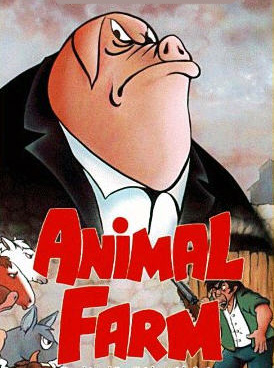 "The Sri Lankan state is not run by President Mahinda Rajapakse and the parliament but instead by President Mahinda Rajapakse and his two brothers, Gothabaya and Basil. It is like a farm having been taken over by the animals from human beings with the humans left ejected and now standing in the periphery. It reminds one of George Orwell's classic, Animal Farm written in 1945..." "The Sri Lankan state is not run by President Mahinda Rajapakse and the parliament but instead by President Mahinda Rajapakse and his two brothers, Gothabaya and Basil. It is like a farm having been taken over by the animals from human beings with the humans left ejected and now standing in the periphery. It reminds one of George Orwell's classic, Animal Farm written in 1945..."
|
| 14 February 2007 | When Sinhala Politicians fall out, truth may out? - Sacked Sri Lanka Foreign Minister Mangala Samaraweera & President Mahinda Rajapakse |
| 6 February 2007 | Ranil: SLFP-UNP pact over, dark times ahead “The Cabinet of Ministers have become an international joke; democracy is weakened; the decision making in the government has been limited to few. The role of the Parliament has been de-valued,” Mr. Wickremsinghe said. “The UNP thus finds it impossible to work with the government in finding a solution to the issues referred to in the MOU when the Government has broken this MOU.”
|
| 31 January 2007 | BBC Report: Jumbo Cabinet pushed for Space "The 53-member Sri Lankan cabinet is reported to have postponed its first meeting because there is nowhere big or secure enough for so many dignitaries. The official reason for the postponement was "logistical difficulties". But press reports almost unanimously conclude that the real reason is because there is no room big enough for the country's super-sized cabinet."
|
| 13 December 2006 | Mad Hatters Tea Party |
| 10 December 2006 | 'President faces new opposition' fears Sinhala owned Sri Lanka Sunday Times |
| 20 November 2006 | Why not adhere to democratic values in all matters, big or small? - Simple Simon in Sinhala owned Sri Lanka Daily Mirror |
| 18 October 2006 | Sri Lanka's Illiberal 'Democracy' |
| 9 February 2006 | Abuse of political power led to Judges resignations says Sri Lanka State Bar |
| 13 January 2006 | Free Media Movement calls for Immediate Investigation into Complaint by Sunday Leader Editor of threats by Sri Lanka President Rajapakse "The seriousness of a mere allegation that the President has allegedly used abusive and threatening language against a senior Editor sends shock waves in the media community and serves as a sombre reminder of the insecure and dangerous situation that journalists in Sri Lanka have to face. The FMM strongly defends the right to criticise stories published by media provided all such criticisms are made within a democratic framework. It behoves those holding the highest offices in Sri Lanka to set an example by adhering to accepted democratic norms and principles and help build a progressive media culture in Sri Lanka.." more
|
| 6 January 2006 | A confused, desperate President Rajapakse in political cuckooland - Oru Paper Editorial "..The President’s biggest blind spot appears to be centred down the word “unitary”. He hugs the word to his bosom as if it is some manthram needed to save the Sinhala nation. Addressing a Press conference before his departure to India, he said he wanted to study the Indian model of devolution of power; as if he could not study it from Colombo. ... The Tamils who are running their own government in another part of the country have reason to laugh over President Rajapakse’s great desire to grant them “maximum devolution” through a unitary form of government..." more
|
| 1 January 2006 | Plot to kill Head of Media Organisation |
| 27 November 2005 | 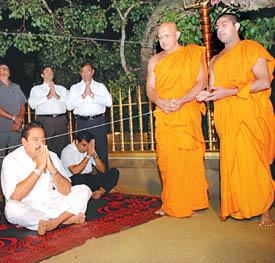
President Mahinda Rajapakse at Kathirgamam
on 27 November 2005
|
| 23 November 2005 | Anura Bandaranaike &
Sri Lanka President Mahinda Rajapakse
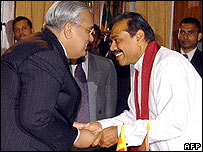
கண்ணோடு கண் நோக்கின்,
வாய்ச் சோற்களின் பயன் என்ன? |
| 22 November 2005 | புலிகளின் அழுத்தத்தினால்தான் தமிழ் மக்கள் வாக்களிக்கவில்லையா? - க.வே.பாலகுமாரன் |
| 21 November 2005 | Centre for Monitoring Election Violence (CMEV) Interim Report on Presidential Elections 2005 |
20 November 2005 | The South has Spoken - Statement by Australasian Federation of Tamil Associations "..By boycotting the presidential election which pitted the openly chauvinistic Mahinda Rajapakse against the equally anti-Tamil, Ranil Wickramasinghe, the Tamil people have allowed the Sinhala South to have its say... The overwhelming majority of the Sinhalese have thus voted for the man who denies .. the Tamil people's right to self determination.."
|
| 19 November 2005 | 2005 Presidential Elections - Interim Report
Peoples Action for Free and Fair Elections (PAFFREL) |
| 19 November 2005 | European Union Observation Mission - Preliminery Statement on Presidential Elections 2005 |
| 17 November 2005 | Live Coverage of Sri Lanka Presidential Election Results by Sinhala controlled Lanka Academic |
| 17 November 2005 | ஜனாதிபதி தேர்தலில் தமிழ் மக்களின் ஒட்டுமொத்த வெறுப்பு - Tamilchelvan in BBC தமிழோசை |
| 16 November 2005 | Sri Lanka's Presidential Election: Why the Tamils did Not Vote - Arthur Rhodes, AsiaMedia Contributing Writer |
| 14 November 2005 | Brian Senewiratne on -One Party State in Sri Lanka:Political Ideology - Anti Tamil "...Recent revelations have confirmed that there may be several political parties in the Sinhala South, but only one ideology – being anti-Tamil. There is the right wing United National Party (UNP), the supposedly socialist Sri Lanka Freedom Party (SLFP), the so-called “Marxist” Janatha Vimukthi Peramuna (JVP), the Marxists of yester-year, the Lanka Sama Samaga Party (LSSP), the political party of not-so-clean-shaven men in yellow robes, the Jathika Hela Urumaya (JHU), and many more of their ilk. In reality they are all different names for one party policy – anti-Tamil. .." more
|
| 6 November 2005 | News First Advertisement Hoarding in Colombo on the Presidential Elections
PLEASE VOTE FOR ME | 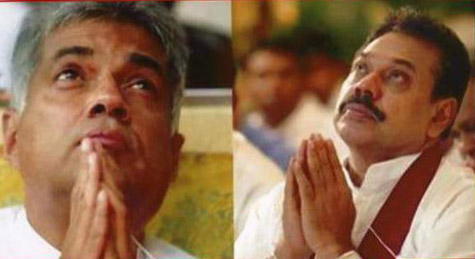
| GOD SAVE SRI LANKA |
|
| 6 November 2005 | Presidential Elections:Two Voices but a Single Thought... "How best to conquer and rule" |
| 29 October 2005 | ஜனாதிபதி தேர்தலும் தமிழ் மக்களும் - சா.ஆ.தருமரத்தினம் |
| 29 October 2005 | தமிழ் இனத்தை அழித்துக்கட்ட உறுதி பூண்டுள்ள மகிந்த - மா.க.ஈழவேந்தன் M.P. |
| 29 October 2005 | ஆண்டவன் உலகத்தின் முதலாளி...? |
| 24 October 2005 | Systematic and widespread police torture in Sri Lanka says Asian Legal Resource Centre "Police in Sri Lanka often operate, not like professional law enforcement agents, but thugs or gangsters, and this gang behaviour is often displayed through abuse, use of violence and torture"
|
| 17 October 2005 | Armed men enter Colombo weekly press, set fire, warn employees "Free Media Movement condemns the arson attack, which took last night on printing press of the Sunday Leader and Irudina weeklies. This attack threatened not only press freedom but also free and fair election environment in the country. FMM as a co convener of Centre Monitoring Election Violence is very much concerned that violence against media should not be allowed to continue in the context of upcoming presidential election on 17th November..." more
|
| 15 October 2005 | 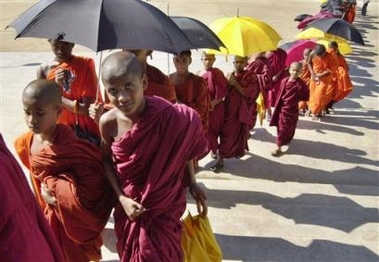
Young Buddhists monks of the all monk political party National Heritage [ Jathika Hela Urumaya (JHU)] arrive at a special convention held to express their support to Sri Lankan Prime Minister and the presidential candidate of the ruling coalition, Mahinda Rajapakse, in Colombo, Sri Lanka, Saturday, Oct. 15, 2005. Monks urged Rajapakse to protect the unitary state of the country once he is elected as the president of the country. (AP Report, 16 October 2005)
|
| 29 September 2005 | Tamils & Christians Short-Changed Again? - Amrit Muttukumaru |
| 1 September 2005 | Lakshman Kadirgamar - “the best foreign minister the country ever had.” J. S. Tissainayagam |
| 10 July 2005 | Democracy Continues, Sri Lanka Style - Government in gridlock as CBK plays for time |
| 13 June 2005 | Buddhist Monks in Political Protest Demonstration (in the Streets of Colombo) Against Tsumai Aid Deal for Tamil Areas  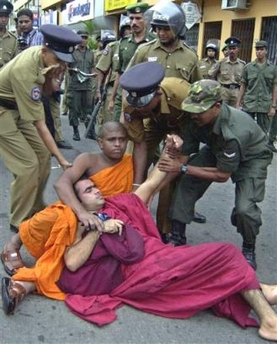
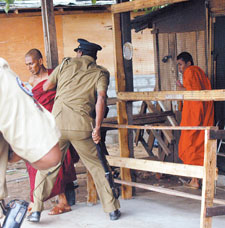 
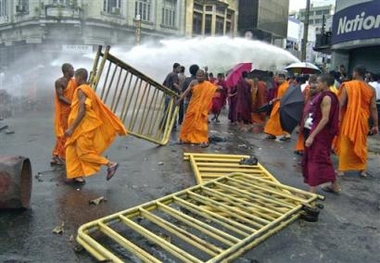
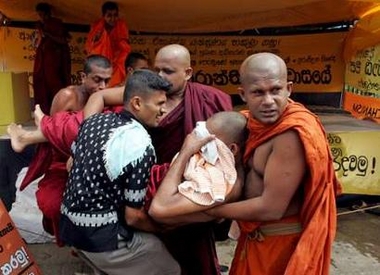
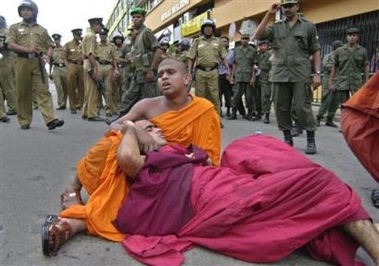
|
| 17 May 2005 | Death threats and escalation of violence in Sri Lanka says Asian Human Rights Commission "..The increase in death threats and intimidation to activists and journalists in Sri Lanka are alarming. In particular, there is concern that the situation may degenerate into that similar to the terror of the late 1980s.The law enforcement authorities have lost all semblance of control, with extrajudicial killings and death threats being made openly..."
|
| 23 January 2005 | Sieg Heil, Kumaratunga! - Sri Lanka Sunday Leader on President Kumratunga's announcement 'No Elections for Five Years' "...Speaking at Hambantota last Wednesday, President Chandrika Kumaratunga ...(said) 'There will be no elections for five more years'.... knowing full well that her six-year term is billed to end November next. Tsunami or no tsunami, Kumaratunga is widely expected to leave no stone unturned in seeking a constitutional amendment to facilitate her continued existence in politics. Faced with a constitutional impasse, Kumaratunga has been widely predicted to seek extra-constitutional means of remaining in office. Few however, had expected her, like her mother before her, simply to call off elections and sit tight regardless of procedural nicety..." more
|
| 22 January 2005 | Government's call for unity is an empty ballyhoo, says JVP, Dominant Coalition Partner of Government - Two Voices but One Policy a.k.a. Bad Cop, Good Cop Routine? "Mounting an all-out attack against President Chandrika Kumaratunga's leadership, major coalition partner of her Freedom Alliance government, radical Janatha Vimukthi Peramuna (JVP) has said on Friday that the call by the government leadership for national unity was an "empty ballyhoo". Describing the United People's Freedom Alliance (UPFA) government's leadership as the "emperor without clothes', a senior member of the JVP, who is also the Minister of Small and Rural Industries, K.D. Lal Kantha has urged the people not to expect the present government leadership to rebuild the nation and also "not to expect the 'big people' to tell them this home truth"...Although President Chandrika Kumaratunga has set up several Task Forces to handle relief, rehabilitation and reconciliation program aftermath the tsunami, she has not included a single JVP member or supporter to any of them, a decision widely seen as a move to sideline or cut the always rhetoric JVP to size..."
|
| 20 January 2005 | Kumaratunga's stand to extend her term of office, undemocratic and opportunistic, says UNP "President Kumaratunga, seizing the tsunami disaster as an opportunity to extend her presidential term, is behaving in an undemocratic and opportunistic manner, charged the main oppostion United National Party (UNP) Parliamentarian Prof. G.L.Peiris at a press conference held in Sinhala at the Oppositon Leader's residence Thursday. Stating that there is no change in UNP's stand that the Presidential election should be held December 2005, he said relief work need to be carried out independently with full transparency according to workplans agreed with involvement of all parties. He also charged that the United People Freedom Alliance (UPFA) government is attempting to utilize the funds for its own agenda without involving and initiating discussion with the opposition."
|
| 16 June 2004 | Statement by John Cushnahan Chief Observer EU Election Monitoring Mission - Elections, April 2004 |
| 8 June 2004 | Sri Lanka's parliament adjourned for July 20 after disruption |
| 8 June 2004 | Pandemonium in parliament, two monk MPs injured, |
| 6 June 2004 | 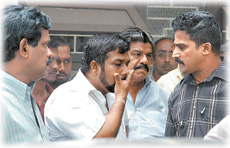
"A shaken Deputy Minister Sripathi Suriyaarachchi talking to supporters who gathered at his Kelaniya office after yesterday’s noon attack that killed two of his bodyguards." Sri Lanka Sunday Times, 6 June 2004
|
| 2 April 2004 | European Union Observation Mission Final Report - Elections April 2004 |
| 15 February 2004 | Lakshman Gunasekera in Deconstructing Democracy, Sri Lanka style "... I got the feeling that the Sinhalas did not want to know too much about what their armed forces were doing to suppress the irritant that was the burgeoning Tamil insurgency. There was implicit popular endorsement of such cruel repression. After all, the JRJ and subsequent regimes that continued the suppression of the Tamil struggle for self-determination were elected by the people, especially the Sinhala people. Just as much as the people of the United States are partly responsible for the government they elected (despite the voting gimmickry in Florida) and, therefore, for its actions including its crudely imperialist strategy in Iraq and rest of West Asia, so are the Sinhalas responsible for their elected governments. And the people must, therefore, bear both the sorrows and joys that result from the rule of their elected leaderships, both Presidential and Governmental..."
|
| 2 November 2000 | European Union Observer Team Reports - General Elections 2000 "...(At the Sri Lanka General Election in October 2000)...most of the pre-election violence for example in Anuradhapura and Kandy was initiated by (President Kumaratunga's) PA (People's Alliance). And these were not isolated, single cases - one may well speak of some kind of pattern. We collected a great body of evidence which all testify the very harassment and open intimidation of for example UNP supporters by PA supporters, both before and on the polling day... In terms of the pre-election period, the PA did not stick to the 48 hours of silence, but went on campaigning, even the night before the elections. The road and buildings on the way to the polling stations were covered by fresh PA posters, political campaign material etc.
|
| 14 October 2000 | Report by Centre for Monitoring Election Violence - General Elections 2000 "...It is CMEVs considered assessment that taken as a whole the 2000 General Election was significantly marred by violence and election-related violations. In addition, the ongoing offensive in the Jaffna peninsula, as well as the de facto deprivation of voting rights to approximately 250,000 Tamil voters in so-called uncleared areas in the North-East Province has resulted in the election being a fraud in this province. In the rest of the country, 35 of CMEVs monitors and observers were threatened and intimidated by supporters of the Peoples Alliance. The incidents reported on election day include 07 murders, which brings the total number of deaths during the election period to 73..."
|
| 24 October 2000 | Sri Lanka's Elections 2000: Fear and Intimidation Rule the Day - An Observer's Report - Laura Gross "...The progressive destruction of the political process in Sri Lanka has led to both domestic and international tolerance of an enormous amount of violence by the government (regardless of party affiliation) against its citizens. Increasingly, it seems that the government of Sri Lanka is accountable to no one - not its citizens, and not its foreign counterparts who rubber-stamped the recent parliamentary elections. In Sri Lanka's current political climate, power seems to be determined by the number of thugs a given politician has at his/her disposal..."
|
| 9 October 2000 | Report by Centre for Monitoring Election Violence General Elections 2000 "...The entire election is a sham and a fraud in the Kilinochchi and Mullaitivu electorates, as well as in the "uncleared" areas and regions of current conflict and civilian displacement in the Batticaloa, Trincomalee, Mannar and Jaffna districts. It is estimated that approximately 200 polling centres which should cater to 250,000 registered voters will be relocated in areas utterly inaccessible to the legitimate voters in these areas.... In summary it should be noted that the campaign phase of the 2000 General Election has proved to be both qualitatively and quantitatively more violent than the 1999 Presidential Election, where the total number of incidents reported was 1483 of which only 48% were Major ones. Though CMEV did not monitor the 1994 General Election, available data indicate that the current election is more violent... "
|
| 15 July 2000 | British Refugee Council on Sri Lanka's Endless Emergency Rule "..Emergency rule in Sri Lanka continues since 1971, except for brief intervals. From independence in 1948, upto the end of June 2000, the island has been under Emergency rule for 9,825 days (nearly 27 years out of 53 years of independence). This has permitted serious derogations by successive Sri Lankan governments of rights protected under the International Covenant on Civil and Political Rights (ICCPR). .."
|
| 25 May 2000 | Reporters sans frontières (RSF), Paris protests against the closure of three newspapers by Sri Lanka President Chandrika Kumaratunga |
| 15 December 199 | Presidential Election 1999 - Free & Fair? - British Refugee Council "In the run-up to the presidential elections since nominations on 16 November and during elections, over 1,590 violent incidents were reported despite the deployment of 75,000 police and 25,000 troops. This included 54 murders, 30 attempted murders, arson, injury and damage to property. According to election monitoring agency, the Peoples Action for Free and Fair Elections (PAFFREL), 900 complaints of election violations were received. The Centre for Monitoring Election Violence (CMEV) says that in 59 of the 161 electoral divisions, the results had been irredeemably compromised by systematic impersonation, ballot stuffing, violence, intimidation of voters and abuse of state machinery and resources."
|
| December 1999 | Sri Lanka Presidential Elections 1999 and CMEV Reports |
| 10 December 1999 | Tamils in Auckland call for expulsion of Sri Lanka from all organisations of Democracies & Civilised Nations |
| 5 December 1999 | Collaborationist Tamil Parties: Rearranging the Deck Chairs on the Titanic - Dr. S. Sathananthan |
| 15 April 1999 | Lost Dream of Free and Fair Elections says Asian Human Rights Commission "The people of Sri Lanka can no longer hope for the peaceful exercise of their right to freely elect their representatives at national, or even local, elections...The concept of free and fair elections has become an illusion in Sri Lanka..."
|
| 7 September 1999 | Gunmen kill independent Journalist "Unidentified attackers shot dead the editor of an anti-government newspaper here Tuesday, police and his colleagues said. Gunmen killed Rohana Kumara, editor of the Sinhalese-language Satana, or the Struggle, while he was going home in a three-wheeler taxi in the Colombo suburb of Mirihana, police said... Colleagues said Rohana Kumara had been publishing reports critical of the government... The Paris-based media right organisation, Reporters Sans Frontiers (reporters without borders), said the killing appeared to be a "serious warning" to independent journalists in Sri Lanka. "The journalist was well known for his strong criticism of the Sri Lankan authorities," the RSF said in what it called a press freedom alert...."
|
| 15 July 1999 | Members of Sri Lanka Presidential Security Division Attack Sinhala Journalists "The Free Media Movement vehemently condemns the attack on members of the media, who covered the (Sinhala) Opposition Protest Rally today (15th July). Media personnel were assaulted, their cameras and equipment snatched and some arrested by a group of persons dressed in police uniform and civil attire. All information available shows that this was not a spontaneous act but a premeditated action. It is clear that the very same police personnel who moved to disperse the opposition protesters by tear gassing and shooting, attacked the media personnel who were reporting these incidents. Journalists have identified several persons, among those who attacked them, dressed in civil attire, to be from the Presidential Security Division. This is the worst attack on the media in recent history...."
|
| 15 April 1999 | Lost Dream of Free and Fair Elections says Asian Human Rights Commission "The people of Sri Lanka can no longer hope for the peaceful exercise of their right to freely elect their representatives at national, or even local, elections...The concept of free and fair elections has become an illusion in Sri Lanka..."
|
| 15 April 1999 | British Refugee Council on Democracy, Sri Lanka style... April 1999 "In elections marked by violence, the ruling Peoples Alliance (PA) secured a slender victory on 6 April, in all five Provincial Councils, four of which were earlier controlled by the main opposition United National Party (UNP)..... Over 340,000 votes were spoiled, including 50,000 in Colombo District, indicating according to observers, a loss of public confidence in the electoral process. Some 32,500 policemen were deployed, but there was widespread violence in the run-up to and during elections. The police received some 1,000 complaints, including 298 on election day. Murder, grievous injury, abduction and arson were reported. A man was killed in a bomb attack on the UNP office in Kegalle on 4 April. Another UNP supporter died in a clash in Matale on the same day. A PA member was shot dead in Udathumbara on 5 April. ..An organised campaign of intimidation was directed against election monitors..."
|
| 2 February 1999 | Democracy continues, Sri Lanka style... Nadesan Satyendra More than 12 years after Senator A.L.Missen's comments, 'Democracy, Sri Lanka Style' continues to flourish. The reliance on extraordinary powers unknown to a free democracy continues. Torture continues on a systematic basis. The disenfranchisement of the opposition continues and the Sixth Amendment to the Sri Lanka constitution stands unrepealed. The muzzling of the media and politically motivated attacks on journalists continue with increasing frequency. And, the impunity afforded to violators of human rights and perpetrators of extra judicial killings, torture and rape proves the deep involvement of successive Sinhala governments in nurturing 'Democracy, Sri Lanka Style'.
|
| 26 September 1996 | Address by Lakshman Kadirgamar, Sri Lanka Foreign Minister at 49th Session of UN General assembly " I, as a representative of the minority Tamil community said, and I shall repeat it here in this supreme parliament of the peoples of the world: 'Let it never be said, if it could ever have been said, that the Sinhala people are racists. They are not. They are absolutely not, and I think this election has demonstrated that so handsomely that that particular argument can be laid to rest for ever."
|
| 1996 | Sinhala Ruling party Murdering Sinhala Opposition - 1996 President Kumaratunga's Reactions - “Without tearing posters, jeering at rivals and pelting stones ........ there is no fun in doing politics.” “If they carry guns, they (UNPers) have to be sliced to death.” “Our people are not wimps and the people of my constituency also know that that I am not a wimp.” .....
|
| 15 April 1994 | Why did UNP lose in the South? - Nadesan Satyendra "The Sinhala dominated United National Party which had ruled Sri Lanka since 1977, suffered its first major defeat at the Provincial Council elections for the Southern Province when it lost heavily to the opposition Sinhala Peoples Alliance led by Chandrika Kumaratunga in early 1994. It was a defeat which paved the way for the Peoples Alliance victory at the Parliamentary Polls later in the year and the subsequent election of Chandrika Kumaratunga as Sri Lanka President. .. However, in the end, so far as the Tamil people are concerned, it is not a matter of great moment as to who rules Sinhala Sri Lanka - what matters is that whoever who rules does not seek to extend his (or her) rule to Tamil Eelam. And here the bottom line, as always, is the strength of the resistance led by the Liberation Tigers of Tamil Eelam and the extent to which that strength is nourished by the Tamil people. .."
|
| 15 October 1992 | Premadasa's Dilemma "... herein, lies President Premadasas dilemma. He can no longer keep the rising Sinhala opposition at bay by keeping a low level conflict going in the NorthEast. He faces a restless army in-creasingly concerned with the number of casualties inflicted on it by LTTE ambushes and attacks and a crisis laden economy which cannot continue to sustain a low level conflict endlessly. But if he relies on the army to try to finish off the LTTE, he knows that even if Jaffna is captured, he may end up with a pro-tracted guerilla resistance, increased dependence on an army made more powerful by whatever successes it achieves, coupled with Goigama Sinhala opposition forces, which have always re-garded him as an outsider. He knows that he cannot do a JVP on the entire Sinhala opposition...The question is whether the dilemma that President Premadasa faces will help to concentrate his vision and persuade him to see (1) that recognition and legitimisation will pave the way towards negotiation; and (2) that, in the end, self-determination is not a dirty word..."
|
| 15 October 1991 | Premadasa Impeachment "The struggle to remove President Premadasa serves to expose the true nature of democracy, Sri Lankan style. It also serves to expose the underlying hypocrisy of the Sri Lankan governments preconditions for talks with the Liberation Tigers. ...On September 24, 1991 the Sri Lankan Parliament met to consider the impeachment resolution against President Premadasa. His effort to address Parliament was met with sustained booing and shouting from the opposition, and the sittings were adjourned in disorder."
|
| 13 March 1986 | Senator A.L.Missen, then Chairman of the Australian Parliamentary Group of Amnesty International, in the Australian Senate: "....The democracy of Sri Lanka has been described in the following terms, terms which are a fair and accurate description: 'The reluctance to hold general elections, the muzzling of the opposition press, the continued reliance on extraordinary powers unknown to a free democracy, arbitrary detention without access to lawyers or relations, torture of detainees on a systematic basis, the intimidation of the judiciary by the executive, the disenfranchisement of the opposition, an executive President who holds undated letters of resignation from members of the legislature, an elected President who publicly declares his lack of care for the lives or opinion of a section of his electorate, and the continued subjugation of the Tamil people by a permanent Sinhala majority, within the confines of an unitary constitutional frame, constitute the reality of 'democracy', Sri Lankan style.'" (Australian Senate Hansard, 13 March 1986)
|
| 15 May 1985 | Democracy, Sri Lanka Style - Nadesan Satyendra "..In Sri Lanka, today, it is democracy that is in crisis. It is in crisis because the Sri Lankan government seeks to hang on to power, by whatever means, and if necessary, by a naked and open appeal to Sinhala chauvinism - a chauvinism which refuses at every turn to recognise the existence of two nations in Sri Lanka and the consequent need to structure a polity where both nations may live together in equality, in freedom and with self respect, a chauvinism which seeks to subjugate the Tamils in the island of Sri Lanka and bend them to the will of a permanent Sinhala majority. The disturbing question is whether President Jayawardene's government can survive in any other way - whether it can survive, if Sri Lanka was a democracy. .."
|
| 1 February 1985 | U.S. State Department's Annual Human Rights Report to Congress released February 1985 "Sri Lanka is an open, working, multiparty democracy. Citizens elect their president, members of parliament, and local government officials by universal adult suffrage. All laws including acts extending the state of emergency, must be approved by the Parliament... The Constitution guarantees the independence of the judiciary, and lawyers and judges are held in high esteem."
|
| 15 February 1983 | Address at the Trial of Thangathurai & Kuttimuni, February 1983 "If national security is to mean anything at all it must be concerned with securing the freedom of the individuals who constitute the nation. That is what national security is about. It is true that balances must be struck particularly in times of emergency but in this area of the law I can, perhaps, do no better than to read to this Court, that which Lord Chief Justice McDermott said in the Juridical Review in 1972 - statements which retain their eloquence, relevance and power even today or perhaps, even more so today, here in Sri Lanka. He was writing on Law and Order in times of Emergency. He said that a passion for liberty is the mark of a free people. He said that it was much more than a piece of political rhetoric to say that it is not for glory or riches or honours that a people fight but only for liberty which no good man will consent to lose but with his life. Then comes the passage to which I would direct this Courts attention and is the reason for my citing Lord McDermott to you. He said: "If some day the well being and survival of a whole nation comes in some way to depend on finding out a secret locked in some man's mind, Parliament might think it right to sanction methods now unlawful which would be likely to make interrogation productive. But we may hope and pray that such a day is far distant. Should it be thought that the day has already arrived, those in power would stand on a steep and slippery slope with no sure way of knowing where or how to stop and liberty might come to die from the efforts made on her behalf".
|